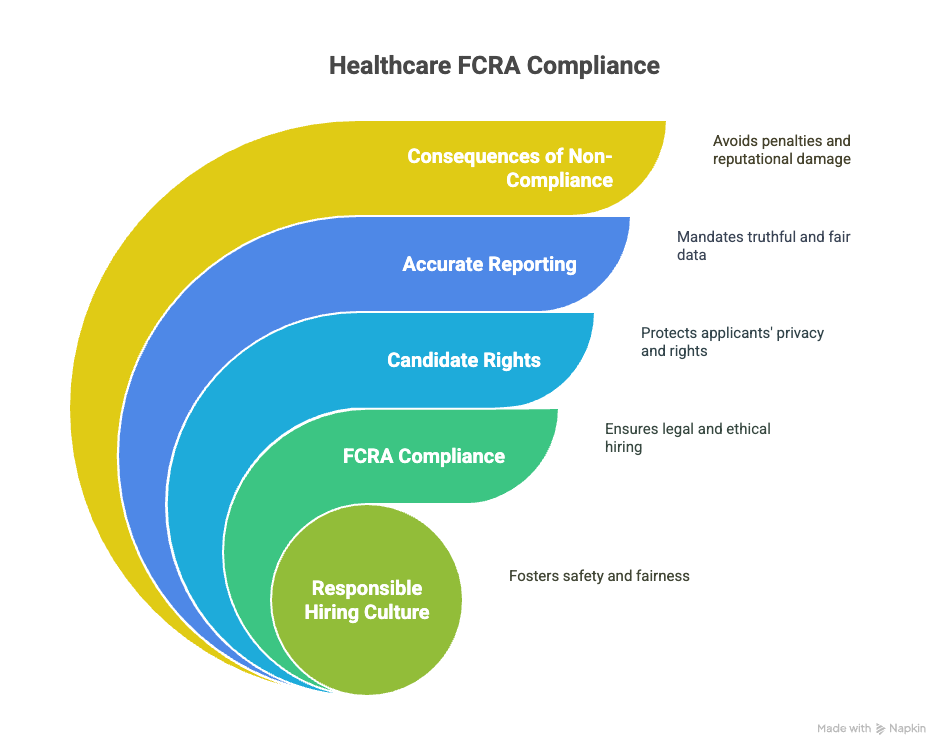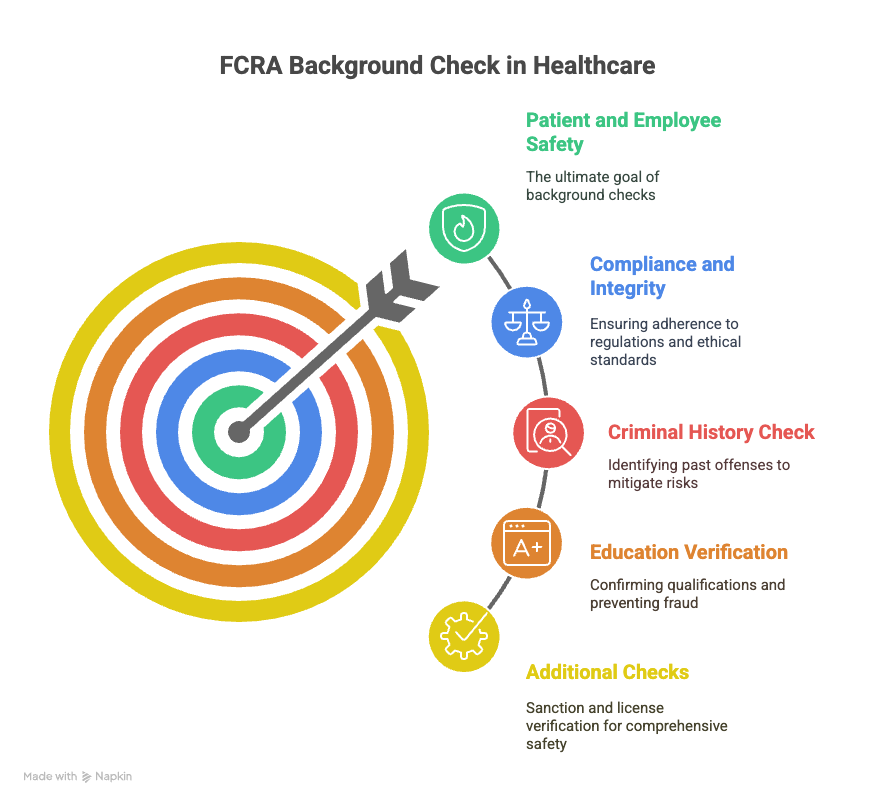Navigating the landscape of hiring in the healthcare industry can be complex, especially when it comes to compliance with federal regulations. One of the most critical regulations healthcare HR teams must adhere to is the Fair Credit Reporting Act (FCRA). This guide will equip you with the necessary knowledge to ensure your hiring processes are fully compliant and efficient.
Key Takeaways
- FCRA compliance is crucial in healthcare HR to protect patient safety and maintain organizational trust.
- Ensure you have proper consent and provide candidates with their rights before conducting background checks.
- Conduct comprehensive background checks, including criminal history and license verification, to prevent hiring unsuitable candidates.
- Stay informed about federal and state pre-employment screening laws to avoid legal issues in your hiring process.
- Implement an efficient FCRA authorization form and establish a clear adverse action process to maintain transparency and compliance.
Introduction
The Fair Credit Reporting Act (FCRA) sets the rules on how consumer information is handled. It's a federal law aimed at ensuring accuracy and privacy in consumer reports used for employment decisions. Your role in healthcare HR requires understanding and applying these rules to protect both your organization and its patients.
Why does FCRA compliance matter so much in healthcare? The stakes are higher in this field due to the direct impact on patient safety and trust. You deal with sensitive roles where any oversight might lead to significant consequences. Imagine hiring someone with a hidden history of malpractice or criminal activity. The potential risk to patients and your institution's reputation is immense.
In healthcare, every hiring decision carries weight. FCRA compliance offers a structured way to vet candidates thoroughly and legally. It helps mitigate risks, ensuring that only the most suitable and trustworthy individuals join your team. By aligning with FCRA guidelines, you're not just following the law but securing your organization’s integrity and patient trust.
Understanding Healthcare FCRA Compliance
Healthcare FCRA compliance ensures that your hiring process respects federal regulations, focusing on candidate rights and the appropriate use of consumer reports. When you're in healthcare, this compliance is a vital guardrail, protecting both the organization and its patients. It involves obtaining proper consent from applicants before conducting background checks. It also mandates providing a copy of the report and a summary of rights to the applicant if the report leads to adverse employment decisions.
Consider the sensitive nature of healthcare roles. You’re not just hiring for skills; you’re entrusting individuals with the welfare of patients. The FCRA mandates accuracy in reporting for good reason. Inaccurate data could lead to unfair hiring decisions, potentially missing out on a qualified candidate or, worse, hiring someone unsuitable for a critical role.
Non-compliance can lead to significant consequences, including lawsuits and financial penalties, damaging reputations and financial stability. For instance, there was a major healthcare provider that faced a hefty fine and a lawsuit after failing to provide a pre-adverse action notification. This oversight not only cost them financially but also harmed their brand's credibility.

Are your current practices ensuring compliance with these standards? Failure to ask this question can lead to problems. Effective compliance safeguards your organization and builds trust with applicants. It's not just about meeting legal obligations; it's about fostering a responsible hiring culture that prioritizes safety and fairness.
FCRA Background Check in Healthcare
Background checks in healthcare serve a critical role in managing risk. They ensure the safety of patients and the integrity of the organization. You must conduct thorough and compliant checks to protect your patients and employees from potential harm. In healthcare, you deal with sensitive data and vulnerable individuals. A lapse in background screening could result in serious consequences.
An FCRA background check comprises several key components. First, it includes a criminal history check to identify any past offenses. This step helps prevent hiring individuals with a criminal past that could pose risks to patients or staff. Next, education verification is essential to confirm that your candidates have the necessary qualifications for their roles. Fraudulent credentials are a growing concern, making this verification a critical step. Credit reports, while not always applicable, can provide insights into financial responsibility, which may be relevant for certain positions involving financial duties.
In healthcare, you need to consider additional checks. Sanction checks, for instance, identify whether a candidate has been excluded from participating in federal health programs. These checks protect you from employing individuals who are barred from working in the healthcare industry. Professional license verification is another significant step. It ensures that medical staff hold valid and current licenses to practice, safeguarding your organization against malpractice claims.

Your diligence in conducting these checks reflects your commitment to compliance and safety. Each component of the background check serves a purpose and collectively helps create a safe environment for both patients and employees.
Healthcare Pre-employment Screening Laws
In your role, keeping up with federal and state healthcare pre-employment screening laws is crucial. These regulations are not static. They interact intricately with the FCRA, shaping the way you conduct background checks.
Federal laws set broad standards for pre-employment screening. For instance, the FCRA governs how consumer reports are used, ensuring that individuals' privacy is respected. In healthcare, this means you must secure proper consent before running background checks and provide a clear, written disclosure stating that a report may be obtained.
State laws add another layer of complexity. They can impose additional restrictions or requirements on top of federal regulations. Some states, for instance, have ban-the-box laws that prohibit asking about criminal history on initial job applications. You need to be aware of these state-specific regulations to avoid legal pitfalls.
Keeping up with evolving legislation is part of your job. Laws change and trends emerge, reflecting shifting societal values and technological advancements. For example, recent years have seen more attention on how artificial intelligence impacts hiring processes, prompting discussions about new regulations to address potential biases.
Balancing thoroughness and compliance requires a strategic approach. You want to ensure you hire suitable candidates while respecting legal frameworks. Thorough vetting means considering factors like criminal history checks, credential verification, and drug testing. Compliance means doing it all within the legal boundaries set by the FCRA and state laws.
Stay informed and maintain a routine review of both federal and state laws. This vigilance ensures your healthcare organization remains compliant while hiring the best talent to deliver safe and reliable patient care.
Implementing the FCRA Authorization Form in Healthcare
The FCRA authorization form is pivotal for obtaining consent from job candidates before conducting background checks. You'll need this signed consent to legally access an applicant's credit and background information. It's not just a box to check; it's about transparency and respect for privacy. By clearly explaining the purpose of the background check, you foster trust with the candidates you're considering.
Crafting a compliant FCRA authorization form is straightforward yet crucial. Include the specific types of checks you plan to conduct, such as criminal records, credit history, or professional licenses. Avoid combining this form with unrelated employment documents. Keeping it separate prevents potential legal complications.
When it comes to distributing the form, clarity and efficiency matter. Provide it at the early stages of the hiring process, ideally during the application phase. Electronic signatures can streamline this step, ensuring you quickly receive and store consent forms while maintaining a clean, auditable trail.
Have you ensured that your authorization form is not bundled with other hiring paperwork? Such oversights can lead to non-compliance, bringing unnecessary risks to your organization.
FCRA Adverse Action Process for Healthcare HR
Adverse action refers to the steps an employer takes if they decide not to hire an applicant based on their background check. For healthcare HR teams, this process needs careful handling due to the sensitive nature of the sector and the potential impact on people’s careers.
Begin with a "pre-adverse action notice." This lets the candidate know that an unsatisfactory background check result might affect their employment opportunity. Include a copy of the background check report and a summary of their rights under the FCRA. This step allows the candidate to review and dispute any errors in the report.
Next, give the candidate a reasonable timeframe, at least five business days, to respond. Use this period to communicate openly and keep records of any responses provided by the candidate. This protects both your organization and the candidate’s rights.
If after consideration, you decide to proceed with not hiring the candidate, send a final "adverse action notice." This notice should state the decision clearly and reiterate the candidate’s rights. Include contact information for the agency that supplied the report to ensure transparency.
Effective communication is essential. Be clear, respectful, and empathetic. Losing a job opportunity can be a significant setback, so maintaining professionalism ensures your organization’s reputation remains untarnished. Are your notices clear and compliant? Reviewing templates with your legal team can prevent costly mistakes.
By following these steps, you align with FCRA regulations and foster trust in your hiring process.
Ensuring Compliance in Healthcare Hiring
You can simplify FCRA compliance in healthcare hiring by building a sturdy checklist. Start with the basics: confirm full disclosure and obtain written consent before any background check. Ensure you have a clear, concise authorization form. Have a system to track these authorizations diligently.
Training plays an integral role in maintaining compliance. Organize frequent training sessions for your HR staff. Update them on FCRA regulations and other related laws. Regular training helps prevent unintentional missteps.
Technology can be your ally in compliance. Many HR software solutions streamline the background check process. They help track authorizations, consent, and any adverse action notifications. Use them to reduce manual errors and keep records easily accessible for audits.
Do you have a compliance checklist? If not, consider creating one. It could save your organization from potential fines and legal issues. Regular reviews of your processes and systems are equally important. Make compliance a continuous effort rather than a one-time task.
Common Challenges and Solutions
Navigating FCRA compliance in healthcare can feel like a game of Whac-A-Mole. Challenges pop up at every turn, complicating your hiring process. Recognizing these hurdles is the first step towards finding effective solutions.
Top Compliance Challenges
Healthcare HR teams often face three main challenges. First, understanding the complexity of FCRA regulations is daunting. The legal language can be difficult to interpret without significant legal expertise. Second, implementing these regulations consistently across all locations is tough, especially in organizations with multiple facilities. Variability in state laws only adds layers of complexity. Last, keeping up with documentation and timelines can also be tricky. Each adverse action must follow a specific timeline, and missing a step could lead to costly penalties.
Proposed Solutions
Tackling these issues requires practical solutions. Start by investing in comprehensive training for your HR team. Regular workshops on FCRA regulations can demystify the legal jargon and align your understanding organization-wide. To address consistency, create standardized procedures that cater to both federal and state laws. This consistency ensures that everyone is on the same page, no matter their location. For managing timelines and documentation, consider leveraging automated systems. These tools help track statuses and send reminders for key actions, reducing human error.
Example
Consider a regional healthcare provider that struggled with inconsistent background checks. By updating their HR policies and investing in compliance training, they achieved uniform application of FCRA processes across all facilities. Another example involves a hospital network that adopted an automated tracking system. This system helped maintain their compliance schedule, significantly decreasing the risk of missing critical deadlines.
Each of these solutions offers a path forward. By addressing your specific challenges with targeted strategies, you can maintain compliance and protect your organization.
Conclusion
FCRA compliance is more than just a legal requirement—it's a commitment to patient safety and organizational integrity. Ensuring every hire is thoroughly vetted while adhering to regulations protects both your organization and those you serve.
Start building your compliance checklist today. Train your HR team continuously. Consider technology to streamline your processes. Each step reinforces your commitment and positions you as a leader in healthcare hiring compliance.
Explore further resources and expand your understanding. Stay informed, stay compliant, and prioritize safety and trust in every hiring decision you make.
Frequently Asked Questions (FAQs)
What does FCRA mean in healthcare hiring?
The Fair Credit Reporting Act (FCRA) in healthcare hiring refers to guidelines that employers must follow when using background checks, including credit reports, during the hiring process. This ensures candidate information is accurate and handled fairly.
Does the FCRA apply to nurses and doctors?
Yes, the FCRA applies to all healthcare positions, including nurses and doctors. If a healthcare employer uses third-party background checks, they must comply with FCRA requirements.
What is the pre-adverse action process under FCRA?
Before making an adverse hiring decision based on a background check, employers must first send a "pre-adverse action" notice to the candidate. This includes a copy of the report and a summary of their rights.
How long should HR wait between pre-adverse and adverse action?
HR should wait a reasonable amount of time, typically five business days, to give candidates a chance to dispute any inaccuracies in their background report before proceeding with an adverse action.
Are healthcare employers allowed to deny employment based on criminal history?
Healthcare employers can deny employment based on criminal history, but it must be relevant to the job role. They should consider the nature of the crime, time passed, and rehabilitation evidence.
What rights do job candidates have under the FCRA?
Candidates have the right to know if their background check caused an adverse decision, to access a copy of their report, and to dispute inaccurate information.
Is candidate consent required for background checks?
Yes, candidates must provide written consent before an employer conducts a background check as part of the hiring process.
Can a candidate dispute errors found in their background report?
Absolutely. Candidates can dispute any inaccuracies found in their background check report with the reporting agency.
What information is included in a typical healthcare background check?
A healthcare background check usually includes criminal history, employment verification, education verification, and sometimes credit history.
How can candidates prepare for a background check?
Candidates can prepare by reviewing their credit report, ensuring their resume is accurate, and being ready to discuss any potential issues in their background.
Definitions
FCRA Authorization Form
This is a separate document that job candidates sign to grant permission for a background check. It should clearly list the types of information being reviewed—such as criminal history, credit reports, or professional licenses. You must present it as a standalone form, not mixed in with other employment paperwork. Present it early in the hiring process and use electronic signatures for easier tracking. Without proper authorization, accessing a background report may lead to legal violations and financial penalties.
Pre-Adverse Action Notice
This notice alerts an applicant that the employer may deny employment based on background check findings. It must include a copy of the background report and a summary of the applicant’s rights under the FCRA. This step gives the candidate a chance to review and dispute any errors before a final decision is made. How often do you give applicants time to correct inaccurate records? Missing this step can damage trust—and lead to lawsuits.
Adverse Action Notice
If, after the waiting period, you decide not to hire a candidate because of their background report, you must issue this notice. It finalizes the decision and informs the applicant of their rights and the agency that provided the report. Always include your contact details and the reporting agency’s contact as well. A clear adverse action notice protects your organization and demonstrates fair process. Have you checked your template for compliance recently?
Consent
Consent is the applicant’s written agreement allowing you to run a background check. Under the FCRA, obtaining this consent is required before any check takes place. The consent must be informed, meaning the applicant understands what types of checks will be done and why. Skipping this step—even by accident—can lead to serious compliance issues. Do you consistently collect and store all consent forms?
Background Check
A background check gathers information about a candidate’s criminal history, credentials, and other relevant areas. In healthcare, this may also include professional license checks, sanction screening, or drug testing. Every check must comply with federal and state laws. Accuracy matters—false or outdated data can lead to unfair decisions and legal risk. Are you confident in the reliability of the reports you receive?
References
- https://www.ftc.gov/legal-library/browse/statutes/fair-credit-reporting-act
- https://www.consumerfinance.gov/compliance/compliance-resources/other-applicable-requirements/fair-credit-reporting-act/
- https://epic.org/fcra/
- https://students-residents.aamc.org/applying-medical-school-amcas/publication-chapters/summary-your-rights-under-fair-credit-reporting-act-fcra
- https://www.consumerfinance.gov/rules-policy/final-rules/prohibition-on-creditors-and-consumer-reporting-agencies-concerning-medical-information-regulation-v/

GCheck Editorial Team
Meet the GCheck Editorial Team, your trusted source for insightful and up-to-date information in the world of employment background checks. Committed to delivering the latest trends, best practices, and industry insights, our team is dedicated to keeping you informed.
With a passion for ensuring accuracy, compliance, and efficiency in background screening, we are your go-to experts in the field. Stay tuned for our comprehensive articles, guides, and analysis, designed to empower businesses and individuals with the knowledge they need to make informed decisions.
At GCheck, we're here to guide you through the complexities of background checks, every step of the way.





